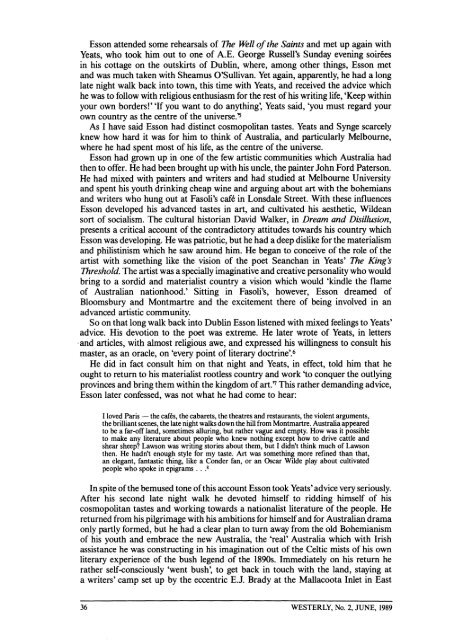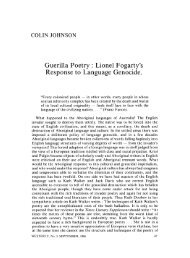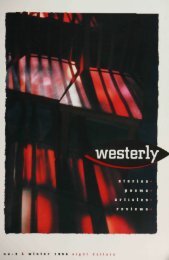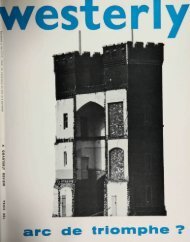Esson attended some rehearsals of The Well of the Saints and met up again withYeats, who took him out to one of A.E. George Russell's Sunday evening soireesin his cottage on the outskirts of Dublin, where, among other things, Esson metand was much taken with Sheamus O'Sullivan. Yet again, apparently, he had a longlate night walk back into town, this time with Yeats, and received the advice whichhe was to follow with religious enthusiasm for the rest of his writing life, 'Keep withinyour own borders!' 'If you want to do anything', Yeats said, 'you must regard yourown country as the centre of the universe.'5As I have said Esson had distinct cosmopolitan tastes. Yeats and Synge scarcelyknew how hard it was for him to think of Australia, and particularly Melbourne,where he had spent most of his life, as the centre of the universe.Esson had grown up in one of the few artistic communities which Australia hadthen to offer. He had been brought up with his uncle, the painter John Ford Paterson.He had mixed with painters and writers and had studied at Melbourne Universityand spent his youth drinking cheap wine and arguing about art with the bohemiansand writers who hung out at Fasoli's cafe in Lonsdale Street. With these influencesEsson developed his advanced tastes in art, and cultivated his aesthetic, Wildeansort of socialism. The .cultural historian David Walker, in Dream and Disillusion,presents a critical account of the contradictory attitudes towards his country whichEsson was developing. He was patriotic, but he had a deep dislike for the materialismand philistinism which he saw around him. He began to conceive of the role of theartist with something like the vision of the poet Seanchan in Yeats' The King'sThreshold. The artist was a specially imaginative and creative personality who wouldbring to a sordid and materialist country a vision which would 'kindle the flameof Australian nationhood.' Sitting in Fasoli's, however, Esson dreamed ofBloomsbury and Montmartre and the excitement there of being involved in anadvanced artistic community.So on that long walk back into Dublin Esson listened with mixed feelings to Yeats'advice. His devotion to the poet was extreme. He later wrote of Yeats, in letters. and articles, with almost religious awe, and expressed his willingness to consult hismaster, as an oracle, on 'every point of literary doctrine'.6He did in fact consult him on that night and Yeats, in effect, told him that heought to return to his materialist rootless country and work 'to conquer the outlyingprovinces and bring them within the kingdom of art. '7 This rather demanding advice,Esson later confessed, was not what he had come to hear:I loved Paris - the cafes, the cabarets, the theatres and restaurants, the violent arguments,the brilliant scenes, the late night walks down the hill from Montmartre. Australia appearedto be a far-off land, sometimes alluring, but rather vague and empty. How was it possibleto make any literature about people who knew nothing except how to drive cattle andshear sheep? Lawson was writing stories about them, but I didn't think much of Lawsonthen. He hadn't enough style for my taste. Art was something more refined than that,an elegant, fantastic thing, like a Conder fan, or an Oscar Wilde play about cultivatedpeople who spoke in epigrams ... 8In spite of the bemused tone of this account Esson took Yeats' advice very seriously.Mter his second late night walk he devoted himself to ridding himself of hiscosmopolitan tastes and working towards a nationalist literature of the people. Hereturned from his pilgrimage with his ambitions for himself and for Australian dramaonly partly formed, but he had a clear plan to turn away from the old Bohemianismof his youth and embrace the new Australia, the 'real' Australia which with Irishassistance he was constructing in his imagination out of the Celtic mists of his ownliterary experience of the bush legend of the 1 890s. Immediately on his return herather self-consciously 'went bush', to get back in touch with the land, staying ata writers' camp set up by the eccentric E.J. Brady at the Mallacoota Inlet in East36 WESTERLY, No.2, JUNE, 1989
Gippsland, Victoria. He threw himself energetically into work, producing poems,ballads, stories and articles.During this burst of creativity Esson also produced his fIrst plays, the work forwhich he is now remembered. Two very different dramatic works came out at aboutthe same time. In 1911 he published a volume of three one-act plays whichdemonstrate clearly his early attempts to follow Yeats' advice. One of them inparticular, Dead Timber, is an extraordinarily gloomy picture of life on a smallselection, with the hostility of the land manifesting itself in the emotional turmoiland defeat felt by an unnamed Farmer and his family. The gloom of the play isa quality which Yeats had not included in his advice. 'Write country comedies', hehad said. The other two plays are colourful vignettes of life in the slums of Melbourne.Esson referred to these plays as 'no more than studies, but they suggest the wayI wish to write. '9The other play which he wrote and produced at this time was a political comedy,The Time is Not Yet Ripe, which even then he was describing in letters as 'five yearsold in style' and which he came to dislike for the rest of his life. It represented forhim, with its wittily cynical dialogue and sophisticated social style, everything whichhe was trying to avoid.By 1914 Esson's faith in the importance of strictly local material was growing.Writing in the Bulletin he was calling for good bush plays, and was quoting withapproval a remark by Havelock Ellis, that 'it is only by being national that onebecomes international.'10 Esson wrote a particularly virulent attack on the Sydneyplaywright Arthur Adams, for writing the English-inspired drawing-room comedywhich Esson loathed:In an authentic Australian play there should be a real atmosphere - some space andsunshine, wild nature or primitive character; something with a cow in it would have beenmuch better; closer to the earth and reality. IIDeep down Esson did not really believe that the earth was the reality which hewas interested in, but he had convinced himself, for the moment, that it was. Atthe same time he was becoming increasingly dissatisfied with the realities of thesociety he was living in. He became unhappy and antagonistic towards Australianmiddle class suburban life, which he saw as philistine and restrictive of the artisticspirit. Beneath this dissatisfaction lay a considerable element of self-doubt. As DavidWalker has written,Behind Esson's attacks upon the mediocrity of Australian society, his growing contemptfor ideas and his preference for life itself, lay a deeper self-distrust rooted in his middleclassorigins in a colonial cuiture. 12The man who believed, in theory, that 'Australia Felix' represented the spirit offreedom and revolution throughout the world actually felt at this time that Australiansociety was weakening his powers of imagination and cramping his work. He wantedto escape. In 1915 he attempted to enlist but was rejected because of his poor health.In 1916 he once again set sail for the other side of the world, to seek inspiration.It is significant that at fIrst he went to New York, the centre of one of the newyoung cultures which were his models of nationalist art. He found it disappointing,and concluded that America was 'the least artistic country in the world', and writingto his friend Palmer that he was 'staggered at the low standards of even the educatedAmerican. '13 So it was beginning to seem that only the old world would do. Fatefully,in New York he met Padraic Colum, the simple poet of the soil with his roots inpeasant Ireland who had ended up a literary fIgure in New York. Esson was headingin the opposite direction, in more ways than one.He arrived in London at the end of 1917 and immediately started to settle intoWESTERLY, No.2, JUNE, 1989 37
- Page 3 and 4: CONTENTSWESTERLYVOLUME 34, No.2, JU
- Page 5: WESTERLYa quarterly reviewISSN 0043
- Page 8 and 9: JAN KEMPTo My Father, M.H.K.My fath
- Page 10 and 11: JAN KEMPThe GypsySuddenly before yo
- Page 12 and 13: WONG PHUI NAMA Death in the WardThe
- Page 14 and 15: WONG PHUI NAMCousinI had to call to
- Page 16 and 17: WONG PHUI NAMObitIt is as thin smok
- Page 18 and 19: So thus I lie here fearful of movem
- Page 20 and 21: VIRGINIA BERNARDA ValedictionWhen N
- Page 22 and 23: "Yeah, yeah," I call, returning the
- Page 24 and 25: she flops for a bit, slurps her tea
- Page 26 and 27: well her students did, she was neve
- Page 28 and 29: English or Indian, that they had th
- Page 30 and 31: ANDREW TAYLORSpringSpring is a dive
- Page 32 and 33: CAROL SElTZERAiming for the MouthTr
- Page 34 and 35: GRAEME WILSONA Selection of Japanes
- Page 36 and 37: a highly ambivalent attitude to his
- Page 40 and 41: the literary life of Bloomsbury. Lo
- Page 42 and 43: Without Yeats Esson would quite lik
- Page 44 and 45: "What theatre do you have in Austra
- Page 46 and 47: In the back room Esson could feel t
- Page 48 and 49: "When we started our little theatre
- Page 50 and 51: a screen against a wall. A theatre
- Page 52 and 53: VINCENT O'SULLIVANSinging Mastery:
- Page 54 and 55: flighty relation in most statements
- Page 56 and 57: living and the dead; that places hi
- Page 58 and 59: quite diverse traditions towards th
- Page 60 and 61: WARRICK WYNNEThe Wetlands (for Liam
- Page 62 and 63: JAN OWENSmileOur mother aimed the b
- Page 64 and 65: RICHARD KELLY TIPPINGOlympic Airway
- Page 66 and 67: DAVID REITERBear by the Jasper Road
- Page 68 and 69: (At twenty eight you did not bother
- Page 70 and 71: left, would have risen and walked o
- Page 72 and 73: He had hair like mine used to be, t
- Page 74 and 75: OLIVE PELLThe QuestionTell me how t
- Page 76 and 77: BRIAN MOONANAT 515: MASS LECTURE Th
- Page 78 and 79: PETER KIRKPATRICKTear HereThe bay i
- Page 80 and 81: JOHN WINTERThe Bird ManIn wooded, p
- Page 82 and 83: KNUTE SKINNERAugust 15There's a lig
- Page 84 and 85: M.E. PATTI WALKERThe Hook"Aren't yo
- Page 86 and 87: QMNQMNQMNQMNapartheid man, this is
- Page 88 and 89:
QMNQMNQMNeasy because you don't bel
- Page 90 and 91:
lands or which have been taken over
- Page 92 and 93:
GEOFF GOODFELLOWToo MuchDianne is 1
- Page 94 and 95:
SHANE McCAULEYSouth Fremantle, Summ
- Page 96 and 97:
JEAN KENTWaiting Out the DroughtWai
- Page 98 and 99:
STEPHEN MAGEEJesus Falls, South Aus
- Page 100 and 101:
SIMON BROWNBlue Hole, Santothe colo
- Page 102 and 103:
CONAL FITZPATRICKA Brown Dog, Off A
- Page 104 and 105:
PAUL HETHERINGTONOne RoomIn teeming
- Page 106 and 107:
society, or, in the terms of the my
- Page 108 and 109:
emphasised (I think) in the referen
- Page 110 and 111:
Summer Leaves". This continues the
- Page 112 and 113:
Deficiency Bill in Western Australi
- Page 114 and 115:
invocation of pastoral near the beg
- Page 116 and 117:
particularly dreaded). The final re
- Page 118 and 119:
VINCENT O'SULLIVAN - is one of New







